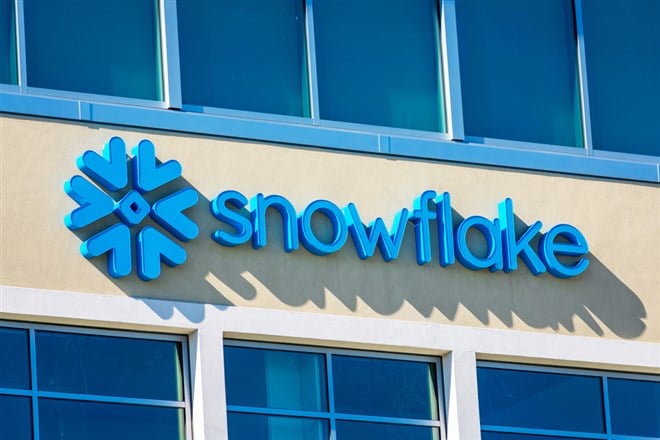
Enterprise software maker Snowflake Inc. (NYSE: SNOW) has notched a three-month gain of 28.85%, far outpacing the S&P 500’s return of 9.32%. With a market capitalization of $52 billion, Montana-based Snowflake qualifies for S&P 500 membership but hasn’t yet gained admission to the large-cap index.
However, benchmarking Snowflake against the S&P 500 is an apt comparison. It’s even more instructive to compare it to the S&P tech sector, as tracked by the Technology Select Sector SPDR Fund (NYSEARCA: XLK), which is up 16.93% in the past three months.
Snowflake shares are etching the right side of a correction that began in September. Despite its market cap, this is a volatile stock, with a beta of 2.10, meaning it’s more than twice as volatile as the broader market. A glance at the chart, particularly using candlesticks rather than lines, shows wide intra-week price swings.
The stock began its still-nascent rally attempt on January 6, moving up from a structure low of $119.27.
Snowflake isn’t the easiest stock to evaluate. On the one hand, analysts are eyeing a pivot to profitability this year, with Wall Street expecting earnings of $0.22 per share, up from a loss of $2.26 a share last year. In 2024, that’s rising by 132% to $0.51 per share.
While all that is certainly positive, there were some red flags when the company last reported earnings on December 1. Revenue topped Wall Street views, as MarketBeat earnings data show, but product revenue guidance for the quarter ended in January fell below expectations.
Revenue in the prior quarter came in at $557 million, up 67% over the year earlier.
Weakening Global Macro Context
In the earnings call following the release, CEO Frank Slootman said, “Snowflake continues to drive strong growth at scale, coupled with strengthening unit economics, operating profit, and free cash flow. While we acknowledge the weakening global macro context, we remain resilient regarding our results.”
He added, “Our focus remains on revenue growth, balanced with free cash flow generation.”
That emphasis on free cash flow encouraged investors once they digested the weaker-than-expected guidance. The stock initially dropped but jumped 7.80% on December 1.
Snowflake specializes in data analytics and management systems for cloud-computing systems, an area that will grow over time, even if there is some slower growth amid high-interest rates and recession fears.
One potential business risk for Snowflake surrounds its business model, which is consumption-based rather than subscription-based. It’s possible that enterprise users could slash usage if they are cutting costs. That’s not as easy with a product locked in as a subscription, with high switching costs.
High-Profile Corporate Customers
On the plus side, more corporate customers are turning toward Snowflake’s cloud-based solutions for data management rather than on-site server firms.
Prominent corporate customers represent a diverse group of industries. They include Adobe Inc. (NASDAQ: ADBE), Airbnb Inc. (NASDAQ: ABNB), AT&T Inc. (NYSE: T), BlackRock Inc. (NYSE: BLK), Congra Brands Inc. (NYSE: CAG), JetBlue Airways Corp. (NASDAQ: JBLU), Novartis AG (NYSE: NVS) and PepsiCo Inc. (NASDAQ: PEP).
Snowflake’s recent price rally is encouraging, especially relative to other techs, and the stock is trading above its 10-, 21-, 50- and 200-day moving averages.
Analysts’ consensus rating is “moderate buy,” as MarketBeat data show. The price target on Snowflake is $188.28, representing a 19.23% potential upside. Since the most recent earnings report, 15 analysts lowered their price target on the stock. However, 13 of those still maintain a price target higher than where the stock is trading today, and some reiterated their “buy” ratings.
Snowflake next reports quarterly results on March 1, after the close, with Wall Street eyeing a loss of $0.48 per share on revenue of $578.20 million. That would be a wider loss than a year ago but a significant increase on the top line.
Use caution with a buy ahead of an earnings report, which could be a catalyst for a big move, either up or down.
